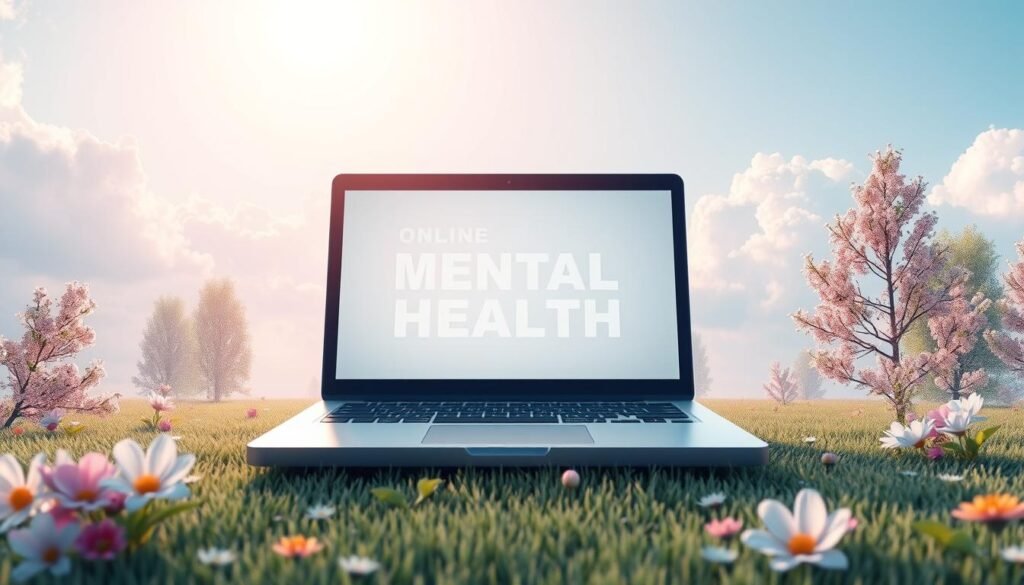Nearly one in five American adults has a mental illness, says the National Institute of Mental Health. This shows how vital mental health awareness and support services are. In this guide, we’ll cover the basics of mental health, when to get professional help, and where to find support for your emotional well-being.
Key Takeaways
- Mental health is key to our overall well-being, affecting our thoughts, emotions, and actions.
- Knowing the signs and symptoms of common mental health issues is the first step to getting help.
- Many mental health professionals, like psychiatrists, psychologists, and counselors, offer personalized care.
- Understanding insurance and cost options is crucial to getting the mental health services you need.
- Having a strong support system, practicing self-care, and using online resources can help with professional treatment.
Understanding Mental Health: Breaking Down the Basics
Mental health is key to our overall well-being. It includes our emotional, psychological, and social health. It shapes how we think, feel, and act, helping us deal with life’s ups and downs.
Knowing the basics of mental health is vital for a happy and balanced life.
Common Mental Health Conditions
Common mental health issues include anxiety, depression, bipolar disorder, PTSD, and schizophrenia. These can affect how well we live if not treated.
Signs and Symptoms to Watch For
Spotting mental health problems is the first step to getting help. Look out for ongoing sadness, sleep changes, trouble focusing, mood swings, and physical signs like headaches or tiredness.
Impact on Daily Life
Ignoring mental health issues can really affect our daily lives. It can make it hard to keep up with work or school, hurt our relationships, and lower our emotional well-being and mental health awareness.
Getting professional help is key to tackling these problems and boosting our mental health support.
“Mental health is not just the absence of mental illness, but a state of well-being in which an individual realizes their own abilities, can cope with the normal stresses of life, can work productively, and is able to make a contribution to their community.”
When to Seek Professional Mental Health Support
Good mental health is key, but sometimes you need professional help. Knowing when to ask for therapy or counseling is crucial. It’s the first step to tackle mental health issues and boost your well-being.
Here are some signs you might need professional help:
- Persistent feelings of sadness, anxiety, or hopelessness that interfere with daily life
- Significant changes in sleep patterns, appetite, or energy levels
- Difficulty managing stress or overwhelming emotions
- Thoughts of self-harm or suicidal ideation
- Significant changes in behavior or difficulty functioning at work, school, or in personal relationships
- Experiencing trauma or a major life transition that is proving challenging to cope with
If you or someone you know is showing these signs, it’s time to seek help. A therapist or counselor can offer the tools and resources you need. They can help you manage your mental health and improve your overall well-being.
“Taking the first step to seek help is a sign of strength, not weakness. Your mental health deserves the same care and attention as your physical health.”
There’s no shame in seeking therapy or mental health support. By focusing on your mental health, you’re investing in a better future for yourself.

| Reasons to Seek Professional Help | Benefits of Therapy |
|---|---|
|
|
By seeking professional mental health support, you can face challenges, build resilience, and live a healthier, more fulfilling life.
Types of Mental Health Professionals and Services
When you’re looking for therapy or counseling, it’s key to know about the different mental health professionals. Psychiatrists, psychologists, and social workers all have their own roles. They help in many ways to support your mental health.
Psychiatrists vs. Psychologists
Psychiatrists are doctors who focus on mental health. They can prescribe medicine and work with other professionals. Psychologists, with their doctoral degrees, focus on talk therapy and counseling.
Counselors and Therapists
Counselors and therapists help with many issues like anxiety and depression. They use different methods to help you cope and improve your life. They work to enhance your well-being.
Social Workers and Support Specialists
Social workers are crucial in mental health care. They work in many places, offering support and resources. Mental health support specialists also play a big role in care.
Knowing about these professionals and their services is important. It helps you choose the right one for your needs.
| Mental Health Professional | Expertise and Services |
|---|---|
| Psychiatrist | Medical doctors who specialize in diagnosing and treating mental health conditions, including the use of medication. |
| Psychologist | Doctoral-level professionals who provide evidence-based psychotherapy and counseling services. |
| Counselor/Therapist | Licensed professionals who offer various forms of talk therapy and mental health support, using different therapeutic approaches. |
| Social Worker | Professionals who provide case management, resource connections, and counseling services in healthcare, educational, and community settings. |
| Mental Health Support Specialist | Individuals, such as peer support workers and psychiatric nurses, who play important roles in the continuum of mental health care. |

“The mental health professional you choose should be a good fit for your needs and preferences. Take the time to find the right provider who can support your journey towards better mental well-being.”
Finding the Right Therapy Services Near You
Starting your mental health journey means finding the right therapy services. This guide will help you find the support you need. Whether it’s your first time or you’re looking to switch, we’ve got you covered.
Begin by researching therapy services in your area. Look for licensed professionals like psychologists or social workers. Use online directories and local mental health groups to find them.
- Think about what you prefer, like the therapist’s gender or approach, to find a good match.
- Check if the services are easy to get to, with good hours and availability.
- Ask about the therapist’s qualifications and experience to see if they fit your needs.
After narrowing your choices, schedule initial consultations. This lets you see if the therapist is right for you. It’s about finding someone who understands and supports your goals.
“Finding the right therapist is like finding the right pair of shoes – it may take some trial and error, but when you find the perfect fit, it can make all the difference in your mental health journey.”
Remember, everyone’s journey is different. By carefully choosing local therapy services, you’re taking a big step towards better mental health. You’re on your way to improving your mental health support.

Online Mental Health Resources and Platforms
In today’s digital world, many online tools support mental health. You can find teletherapy, mental health apps, and online support groups. These options make it easy to get help when you need it.
Teletherapy Options
Teletherapy, or online therapy, is now more popular. It lets you talk to mental health experts from home. You can choose from many services and prices to find what works for you.
Mental Health Apps
There are many mental health apps in the app store. They help with mood tracking, meditation, and more. Apps like Calm, Headspace, and Talkspace offer tools to manage stress and anxiety.
Online Support Communities
Online, you can find communities for mental health support. These groups offer a place to share experiences and get support. Places like Reddit’s r/mentalhealth and NAMI’s forums are great examples.
Exploring these online resources can help you support your mental health. They offer help whenever and wherever you need it.

| Teletherapy Options | Mental Health Apps | Online Support Communities |
|---|---|---|
| Virtual sessions with licensed therapists | Mood tracking, guided meditations, CBT exercises | Reddit’s r/mentalhealth, NAMI’s online forums, Facebook groups |
| Flexible and accessible from home | Calm, Headspace, Talkspace | Peer-to-peer support, sense of belonging |
“Online resources have been a lifeline for me during difficult times. They’ve provided the support and tools I needed to manage my mental health in a way that fits my lifestyle.”
Navigating Insurance and Cost of Mental Health Care
Getting mental health support can cost a lot, but it’s key for your health. Figuring out insurance and finding cheap therapy can be tough. But, knowing your options can help a lot.
Exploring Insurance Coverage
Many insurance plans, like Medicaid and Medicare, cover mental health. But, how much they cover can differ a lot. It’s important to check your plan and talk to your provider to know what you get.
Identifying Affordable Care Options
If you don’t have insurance or it’s not good, there are cheaper ways to get help. Places like community mental health centers and non-profits offer help for less money. Some therapists even give free or cheap sessions.
Utilizing Employee Assistance Programs (EAPs)
If you have a job, your company might have an EAP. These programs give free counseling and other help. They’re a great way to get support without spending money.

“Seeking help for your mental health is a sign of strength, not weakness. Don’t let the cost be a barrier to getting the support you need.”
Dealing with the cost of mental health care can be hard. But, with some effort, you can find affordable help. Remember, your mental health is worth it, and there are ways to make it more affordable.
Building a Strong Support System
Dealing with mental health issues can be tough. But, having a strong support system can really help. Family, friends, support groups, and community resources can all boost your emotional health and strength.
Family and Friends Support
Your loved ones are key during tough times. Talking openly, showing empathy, and understanding can make you feel less alone. Ask your family and friends to listen without judgment and check in often to support your mental health.
Support Groups and Peer Counseling
- Support groups let you connect with others who face similar challenges. It’s a safe place to share your feelings.
- Peer counseling offers advice from people who’ve been through similar mental health issues. It builds a sense of community and strength.
- Both support groups and peer counseling make you feel less isolated. They provide strategies and support for your mental health.
Community Resources
Your local community has many resources for mental health support, such as:
- Support hotlines and crisis services
- Free or low-cost counseling and therapy
- Workshops and campaigns for mental health awareness
- Recreational activities and wellness programs
Checking out these resources can help you find the support you need. It’s good for your emotional well-being.

Building a strong support system is vital for managing mental health. By getting support from loved ones, joining peer-led groups, and using community resources, you can build a network that helps you face mental health challenges with strength and confidence.
Self-Care Strategies for Mental Well-being
Good mental health is key to feeling well overall. Self-care helps manage stress, reduce anxiety, and build emotional strength. It’s great for those looking to ease daily worries or focus on mental health.
Mindfulness and Meditation
Mindfulness and meditation keep you grounded and calm. Spend a few minutes each day sitting quietly, focusing on your breath. Apps like Calm and Headspace offer guided meditations to help you start.
Physical Activity and Exercise
Exercise is good for both body and mind. It can make you feel better, reduce anxiety, and help with depression. Try walking, yoga, or a new workout class to release endorphins.
Prioritize Sleep and Relaxation
Enough sleep is vital for mental health. It lets your body and mind rest. Create a bedtime routine, avoid screens before bed, and make your sleep area relaxing. Try reading, taking a warm bath, or deep breathing exercises to relax.
Nurture Meaningful Connections
Staying in touch with loved ones is good for your mind. Make time for friends and family through calls, video chats, or meetings. Sharing your feelings with trusted people can offer support and a sense of belonging.
Explore Creative Outlets
Being creative can help manage stress and express feelings. Try painting, writing, playing music, or crafting. Creative activities can make you feel more connected and improve your mood.
Self-care isn’t the same for everyone. Try different things to find what works for you. By focusing on mental health through self-care, you can build resilience and enjoy life more.

| Self-Care Technique | Benefits |
|---|---|
| Mindfulness and Meditation | Reduces stress, enhances focus, promotes inner peace |
| Physical Activity and Exercise | Boosts mood, alleviates anxiety and depression, improves overall health |
| Prioritize Sleep and Relaxation | Recharges the body and mind, improves cognitive function, enhances well-being |
| Nurture Meaningful Connections | Provides a sense of support, reduces feelings of isolation, fosters emotional well-being |
| Explore Creative Outlets | Reduces stress, enhances mood, promotes self-expression and personal growth |
“Self-care is never a selfish act—it is simply good stewardship of the only gift I have, the gift I was put on earth to offer to others.” – Parker Palmer
By adding these self-care practices to your daily life, you can manage stress, ease anxiety, and care for your mental well-being. Remember, your mental health is as important as your physical health. Make self-care a priority to find what works best for you.
Crisis Support and Emergency Resources
When you’re in a mental health crisis, fast help is crucial. This part talks about key hotlines, crisis services, and when to get professional help right away.
Hotlines and Emergency Contacts
The National Suicide Prevention Lifeline is available 24/7. It’s free and confidential. Call 1-800-273-8255 to talk to a counselor. They can offer support and help find local services.
The Crisis Text Line is also there for you. Text HOME to 741741 for help during a mental health emergency.
Crisis Intervention Services
Many places have crisis teams that help in emergencies. They assess and stabilize you during a crisis. These teams work with police and hospitals to give the right care.
When to Seek Emergency Care
Knowing when to get help is key. Look for signs like suicidal thoughts, uncontrolled psychosis, or sudden bad symptoms. If you’re in a crisis, call 911 or go to the emergency room.
FAQ
What are the most common mental health conditions?
Common mental health issues include depression and anxiety disorders. Other conditions are bipolar disorder, PTSD, schizophrenia, and OCD.
How do I recognize the signs and symptoms of a mental health issue?
Look out for feelings of sadness or hopelessness that last. Also, watch for excessive worry or fear. Changes in mood or behavior are signs too.
Difficulty concentrating and changes in sleep or appetite are other signs.
How does poor mental health impact daily life?
Poor mental health can make daily tasks hard. It affects work, school, and personal relationships. It also makes managing daily tasks tough.
When should I seek professional mental health support?
Seek help if symptoms like sadness or fear last a long time. If you can’t handle stress or have mood changes, get help. Thoughts of self-harm or suicide are urgent.
What is the difference between a psychiatrist and a psychologist?
Psychiatrists are doctors who treat mental health with medicine. Psychologists focus on therapy and assessment.
How can I find the right therapy services for my needs?
Look at the therapist’s specialty and treatment approach. Check if they accept your insurance. A consultation can help you decide if they’re right for you.
What online mental health resources are available?
Online, you can find teletherapy, mental health apps, and support groups. These offer easy access to help and support.
How can I navigate the cost and insurance coverage for mental health care?
Check your insurance for mental health coverage. Costs vary. Look for affordable options if your insurance doesn’t cover enough.
How can I build a strong support system for my mental health?
Surround yourself with supportive people and resources. Join support groups and seek peer counseling. Connect with local mental health services.
What are some effective self-care strategies for mental health?
Self-care includes exercise, mindfulness, and enough sleep. Eating well and taking breaks from stress also help.
When should I seek emergency mental health support?
In a crisis, like thoughts of self-harm, get help right away. Call a crisis hotline or go to the emergency room.

Hello, I’m Jimmy, founder of Jimmy Cozy Life. I’m here to help you create a home that feels warm, stylish, and balanced. With ideas for decor, celebrations, wellness, and DIY projects, my goal is to share practical tips and a bit of inspiration to make your space truly special.
Disclosure: This post contains affiliate links. If you click and make a purchase, we may receive a small commission at no extra cost to you. The content on this website was developed with assistance from AI.



